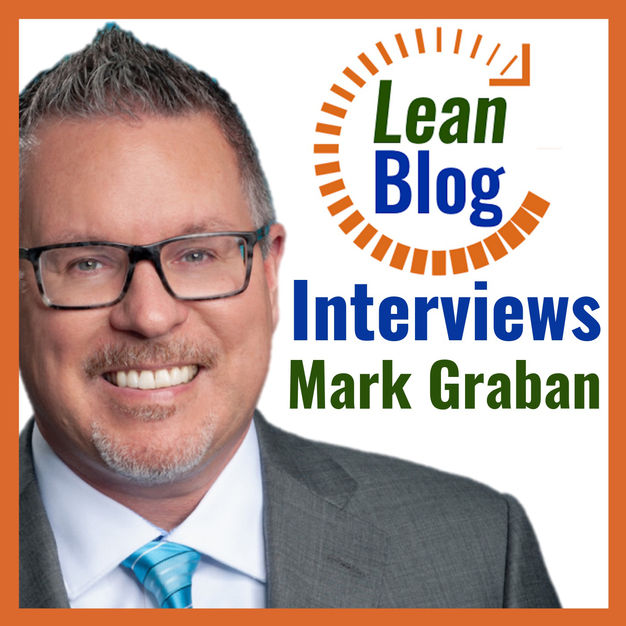
Lean Blog Interviews
Mark Graban
Mark Graban interviews leaders and innovators in the lean thinking world. Topics include lean production, lean thinking, lean healthcare, lean startup and lean enterprise. Visit the blog at www.leanblog.org. For feedback, email [email protected]. Previously called "LeanBlog Podcast."
- 1 minute 11 secondsGemba Claus is Comin’ to Town! [Song]
Here's a musical holiday treat for my regular Lean Blog readers and podcast listeners, a song parody, originally released in 2009... remastered a bit in 2022.
https://www.leanblog.org/2022/12/gemba-claus-comin-town-song/
Gemba Claus is Comin' to TownLyrics by Mark Graban
Performance by Steve SholtesOh, you'd better watch out
You'd better kaizen
You'd better not pout, I'm tellin' ya then
Gemba Claus is comin' to townHe's making a list
Just checking it once
Doin' it twice would waste a whole bunch
Gemba Clause is comin' to townHe sees you when you're waitin'
He knows when your work flows
He knows if changeovers are too long
So do SMED for goodness sakeOh, you'd watch out
You'd better not pause
You'd better not pout
Find the real root cause
Gemba Claus is comin' to Town!For voiceover work, music, or more, you can contact Steve via his website, www.stevesholtes.com.
Merry Christmas and Happy Holidays!
20 December 2024, 4:26 pm - 37 minutes 3 secondsBonus: Preview of Mark Graban's AME Australia "Road Show" in 2025; Improving the Way We Improve
Welcome to this bonus session of the Lean Blog Interviews Podcast, originally recorded as a LinkedIn Live event! In this conversation, I partnered with Rebecca Michalik from AME Australia to discuss my upcoming workshops in Australia and New Zealand in March 2025.
Episode page with video, transcript, and more
We’ll dive into key themes like psychological safety as a foundation for continuous improvement and how to make smarter use of performance metrics through process behavior charts. Even if you’re outside Australia or New Zealand, the principles and practical examples we discuss have universal applications for leaders and organizations worldwide.
If you're interested in learning more about the workshops, click here.
Key Questions:- What is the purpose of the AME Australia roadshow, and what will attendees gain from it?
- Why is psychological safety critical for Lean and continuous improvement?
- How can leaders create an environment where employees feel safe to speak up?
- What are process behavior charts, and why are they a better way to understand performance metrics?
- Can you share examples of organizations that have successfully applied these principles?
- What are some actionable steps attendees can implement immediately after the workshops?
- Why is in-person learning particularly valuable for these topics?
- How do you see these topics applying universally, regardless of industry or location?
- What lessons have you learned in your career that you think every leader should know?
- What would you say to someone who’s on the fence about attending?
The podcast is brought to you by Stiles Associates, the premier executive search firm specializing in the placement of Lean Transformation executives. With a track record of success spanning over 30 years, it's been the trusted partner for the manufacturing, private equity, and healthcare sectors. Learn more.
This podcast is part of the #LeanCommunicators network.
11 December 2024, 8:45 am - 57 minutes 4 secondsDaily Management, Strategy Execution, and Lean Leadership with José Ferro
My guest for Episode #521 of the Lean Blog Interviews Podcast is José R. Ferro, PhD, a Senior Advisor with the Lean Enterprise Institute and the Founder and President, Lean Institute Brasil.
Episode page with video, transcript, and more
By founding Lean Institute Brasil in 1999 to disseminate the principles and practices of lean thinking to Brazilian companies, Ferro helped catalyze a global movement to establish lean institutes in other countries, which ultimately grew into the Lean Global Network, chartered in 2007.
In the late eighties, he was a visiting scholar in MIT’s International Motor Vehicle Research Program (IMVP), which introduced the term “lean” to describe Toyota’s revolutionary management system.
Ferro received PhD and master’s degrees in business administration, Getulio Vargas Foundation, and production engineering from the University of São Paulo in São Carlos.
His new book, Daily Management to Execute Strategy: Solving problems and developing people every day, is available now.
In today's episode, José will share practical insights on how to integrate daily management with strategy, the critical role of psychological safety in fostering problem-solving and improvement, and lessons learned from decades of leadership and Lean practice.
So, stay tuned for an engaging conversation about Lean, leadership, and creating cultures that thrive on continuous learning and improvement!
Questions, Notes, and Highlights:- José's Lean Origin Story: How did you first encounter Toyota-related practices, even before the term “Lean” was coined?
- Initial Impressions: What was your perspective on Lean’s balance between efficiency and a humane approach in its early days?
- Brazil’s Lean Journey: How did the opening of markets in the 1990s influence Lean adoption in Brazil across industries?
- Daily Management Framework: How do you define daily management, and what are its key elements?
- Challenges of Implementation: Why is there often a gap between technical Lean tools and the social aspects like leadership and problem-solving?
- The Book’s Framework: Can you explain the three foundational blocks of daily management from your book?
- Leadership's Role: What’s the leader’s role in connecting strategy to daily execution?
- Psychological Safety: Why is psychological safety so foundational, and how does it coexist with challenging environments?
- Problem-Solving Integration: How can organizations better connect daily huddles with deeper problem-solving efforts?
- Examples in Practice: Can you share real-world examples of organizations successfully applying your daily management framework?
- Future Vision: Where do you see opportunities for Lean to grow in Brazil or globally, especially in non-traditional sectors?
The podcast is brought to you by Stiles Associates, the premier executive search firm specializing in the placement of Lean Transformation executives. With a track record of success spanning over 30 years, it's been the trusted partner for the manufacturing, private equity, and healthcare sectors. Learn more.
This podcast is part of the #LeanCommunicators network.
4 December 2024, 12:01 pm - 56 minutes 1 secondTransforming Operations with Lean Leadership: Bill Remy, CEO of TBM Consulting, on Driving Growth Through Continuous Improvement
My guest for Episode #520 of the Lean Blog Interviews Podcast is Bill Remy, CEO of TBM Consulting.
Episode page with video, transcript, and more
Bill is both an accomplished business executive and leader who is frequently called upon for his credible voice, honesty, and pragmatism — and for his ability to leverage operational excellence and continuous improvement for long-term profitable growth.
As former president of Thayer Aerospace, Bill doubled revenue in six years, expanded into Mexico, improved profitability, and increased inventory turns. He integrated the supply chain into a web-based pull system, consolidated divisions, and implemented an ERP system.
Earlier in his career, Bill held progressively responsible roles in operations, including Vice President of Continuous Improvement at Invensys, Vice President of Operations at Learjet/Bombardier, Production Manager at Lockheed Arizona Missile Facility, and Materials Manager at Allied-Signal Aerospace.
Bill holds both a Master of Science and Bachelor of Science degrees in Industrial Engineering from Oklahoma State University. He serves as Chairman of the Board of Directors for Pancon Corporation and on the Oklahoma State University /deans Advisory Board for the College of Engineering. He has over 25 years of leadership experience in general management and manufacturing operations.
In this episode, we discuss the transformative power of Lean leadership and operational excellence. Bill shares insights from his extensive career, including how he first encountered Lean principles at Allied Signal and the dramatic improvements achieved through lead time reduction and flow.
We explore the critical role of communication and employee involvement in overcoming resistance to change, the deep connection between safety and quality, and the importance of leadership in both driving transformation and sustaining long-term improvement.
Bill outlines TBM’s four-phase framework for turning around operations, emphasizing the need for a holistic evaluation of people, processes, and performance metrics. Finally, we reflect on how organizations can leverage Lean as a strategic advantage to drive growth and profitability while fostering a culture of continuous improvement.
Questions, Notes, and Highlights:- What’s your Lean origin story? How did you first learn about Lean, and what drew you to it?
- Can you describe the initial transformation you led at Allied Signal, focusing on lead time reduction and flow?
- How did you address resistance to change when implementing the model line at Allied Signal?
- How did you ensure communication and involvement during that transformation?
- Can you elaborate on the connection between safety and quality and how improving one supports the other?
- How do you help leaders recognize that safety performance can improve significantly, even if zero injuries seems aspirational?
- Have you seen Lean improve relationships between management and employees, especially where trust was broken?
- What have you learned over time about the cultural and technical aspects of standard work?
- How do you balance moving toward one-piece flow without overwhelming a system that isn’t ready for it yet?
- How do you distinguish between a one-off performance issue and a sign of deeper trouble? How do you address it?
- What qualities or mindsets do leaders need to lead both Lean transformations and long-term sustainment?
- What’s the difference between leaders who are effective in transitions versus those who excel in sustaining improvement?
- How does TBM Consulting evaluate the state of a plant during a turnaround? What does the assessment process involve?
- Can you outline the four phases of turning around operations and share an example of how this approach was applied?
- How do you prioritize improvement work when constrained by resources, like capex or time?
- What warning signs indicate a plant is in trouble, and how do you help organizations prevent further decline?
- How does TBM Consulting differentiate itself in helping businesses use operational excellence as a strategic advantage?
- What insights have you gained about Lean from your career as both a practitioner and a consultant?
- What’s the origin story of TBM Consulting, and how has its focus evolved over time?
- How do you integrate leadership development into Lean practices for long-term success?
The podcast is brought to you by Stiles Associates, the premier executive search firm specializing in the placement of Lean Transformation executives. With a track record of success spanning over 30 years, it's been the trusted partner for the manufacturing, private equity, and healthcare sectors. Learn more.
This podcast is part of the #LeanCommunicators network.
20 November 2024, 7:34 pm - 57 minutes 21 secondsAchieving Healthcare Excellence: Insights from Jarvis Gray on Lean Six Sigma and Leadership
My guest for Episode #519 of the Lean Blog Interviews Podcast is Jarvis Gray, the Managing Director of The Quality Coaching Co. He offers more than 16 years of strategic planning, quality improvement, and operations leadership experience in the healthcare industry.
Episode page with video, transcript, and more
Through his firm, The Quality Coaching Co., Jarvis and his associates help healthcare organizations foster cultures of system-wide quality improvement by offering customized Lean Six Sigma coaching, training, and certification programs centered on improving the quality of their care delivery services and health outcomes, eliminating waste and achieving cost reductions, and enhancing the patient experience.
He's the host of the Excellence in Healthcare podcast (where I have been a guest). His new book is MASTERING HEALTHCARE EXCELLENCE: A Leader’s Guide to Getting World-Class Results by Aligning People, Priorities, and Processes.
In this episode, we explored how to build a sustainable culture of excellence in healthcare by aligning people, priorities, and processes. We discussed the importance of integrating Lean Six Sigma principles with data-driven decision-making to improve patient outcomes and streamline operations.
Jarvis shared insights on establishing frameworks for healthcare excellence, including data cataloging and dashboarding, to track and leverage key metrics. We also delved into the evolving roles within healthcare quality improvement, the lessons learned from working closely with healthcare professionals, and the unique challenges of managing patient-centered processes. Lastly, we touched on his experience as a business owner, applying continuous improvement to his own consulting practice and the value of disciplined operations in achieving long-term success.
Questions, Notes, and Highlights:- What’s your origin story with quality, Lean Six Sigma, and healthcare?
- How did Florida Power & Light's quality culture and Deming Award influence your approach?
- What’s changed in the role of “management engineer” in healthcare since you entered the field?
- When did you start the Quality Coaching Company, and what led to that decision?
- What’s the central message or goal of your new book, Mastering Healthcare Excellence?
- How do you use data in healthcare to achieve excellence, and what tools do you recommend?
- What’s the healthcare excellence business model you promote in the book?
- Can safety or quality serve as a competitive advantage in healthcare? Any examples?
- What key lessons have you learned from healthcare professionals as an engineer?
- Do you have an example of aligning people, priorities, and processes effectively in healthcare?
- What improvements have you made in your own business from lessons learned in coaching?
- For consultants and coaches, what small business coaching insights have helped you?
The podcast is brought to you by Stiles Associates, the premier executive search firm specializing in the placement of Lean Transformation executives. With a track record of success spanning over 30 years, it's been the trusted partner for the manufacturing, private equity, and healthcare sectors. Learn more.
This podcast is part of the #LeanCommunicators network.
6 November 2024, 8:51 am - 55 minutes 33 secondsBreaking the MRP Insanity Trap: Jerry Wright on Lean Systems and Supply Chain Transformation
My guest for Episode #518 of the Lean Blog Interviews Podcast is Jerry Wright, author of the new book The Insanity Trap: What Your MRP Consultant Won't Tell You.
Jerry M. Wright, PE, MBA, is an accomplished operations executive and teaching professional with over 39 years of experience in the manufacturing and service sectors.
His extensive career spans various industries, including aerospace, consumer goods, healthcare, medical devices, diagnostics, and industrial sectors, where he has held leadership roles in engineering, operations, quality assurance, and operational excellence (OpEx).
He is an expert on taking businesses from MRP "insanity" to Pull Systems (Kanban) and driving operational excellence through the implementation of Toyota Production Systems (TPS/Lean) tools and methods.
He's a Master Black Belt and only the 7th person in the world to receive the Lean Gold Certification (LGC) from the joint alliance of ASQ, AME, SME, and the Shingo Institute.
In this episode, Jerry shares his insights and hard-earned lessons about the pitfalls and inefficiencies of Material Requirements Planning (MRP). Jerry reflects on his career, starting with his early Lean experiences at Kimberly Clark, where he encountered the challenges of forecasting, production scheduling, and the recurring "insanity trap" of MRP. He discusses the implementation of Kanban systems, the impact on inventory management, and how turning off MRP systems helped teams dramatically reduce shortages and excess inventory.
Through real-life examples, Jerry illustrates how companies can shift from traditional MRP-driven processes to more effective demand-driven and Kanban-based systems, leading to operational improvements, better employee engagement, and more reliable supply chains. The episode also touches on the psychology of change management, navigating the resistance from those invested in outdated systems, and how leadership can foster a more adaptive, efficient environment by embracing simplicity over complexity.
Questions, Notes, and Highlights:- What is your Lean origin story?
- Were your parents open to Kaizen opportunities or suggestions from you as a child?
- Was your first introduction to the "insanity trap" of MRP at Kimberly Clark?
- Can you describe the challenges of dealing with MRP at Kimberly Clark?
- What was Bill Holbrook's role when he suggested unplugging the MRP?
- How did your team transition from MRP to Kanban, and what were the results?
- Can you explain the issues with relying on forecasts and lead times in MRP systems?
- What do you think about demand-driven MRP as an alternative?
- Why do you think demand-driven MRP isn't more widely adopted?
- How do you balance the risk of excess inventory versus lost sales?
- How did Dell handle material constraints and lead time reduction when you were there?
- How does Toyota manage its supply chain and production planning without relying heavily on MRP?
- Can you talk about how Toyota's system recovers quickly from supply chain disruptions?
- What was the origin of your book The Insanity Trap?
- How can leaders and companies overcome the psychological barriers to changing their supply chain systems?
- How do you help employees transition from roles like expediting to managing Kanban systems?
- What are your thoughts on the promise of AI in demand forecasting and supply chain management?
- Who is the target audience for your book?
- What are your thoughts on supply chain planning versus execution in lean environments?
The podcast is brought to you by Stiles Associates, the premier executive search firm specializing in the placement of Lean Transformation executives. With a track record of success spanning over 30 years, it's been the trusted partner for the manufacturing, private equity, and healthcare sectors. Learn more.
This podcast is part of the #LeanCommunicators network.
30 October 2024, 7:53 am - 16 minutes 13 secondsBruce Hamilton and the Northeast Lean Conference, Toast Kaizen, and More
My guest for this bonus episode of the Lean Blog Interviews Podcast is Bruce Hamilton, who is joining me on the show for the first time. Bruce is a renowned figure in the Lean world, serving as the President of GBMP Consulting Group and Director Emeritus for the Shingo Institute.
As a senior examiner and certified workshop facilitator for the Shingo Prize, Bruce brings a wealth of knowledge and experience. He is also a past recipient of the Shingo Prize in both business and academic categories and has been inducted into both the Shingo Academy and the AME Manufacturing Hall of Fame.
During our conversation, Bruce reflects on two major milestones: the 25th anniversary of the now-classic "Toast Kaizen" video and the 20th year of GBMP's Northeast Lean Conference. He shares the humble beginnings of "Toast Kaizen," filmed in his kitchen with the help of his two-month-old son, and its unexpected success. We also discuss the evolution of the Northeast Lean Conference, from its modest start to an event that now attracts Lean thinkers from across the country. Bruce talks about the upcoming conference theme, “Leveraging Lean to Thrive,” and how Lean principles can help organizations overcome uncertainty, especially in today’s challenging times.
The podcast is brought to you by Stiles Associates, the premier executive search firm specializing in the placement of Lean Transformation executives. With a track record of success spanning over 30 years, it's been the trusted partner for the manufacturing, private equity, and healthcare sectors. Learn more.
This podcast is part of the #LeanCommunicators network.
23 October 2024, 8:02 am - 47 minutes 52 secondsJacob Stoller on Productivity Reimagined and Lean's Role in Growth
My guest for Episode #517 of the Lean Blog Interviews Podcast is Jacob Stoller, a journalist, speaker, facilitator, and Shingo-Prize-winning author of The Lean CEO. We talked about that in Episode 221.
Episode page with video, transcript, and more
His latest book, Productivity Reimagined: Shattering Performance Myths to Achieve Sustainable Growth, was just released by Wiley on October 8th, 2024.
Jacob has published hundreds of articles on technology and business management methods, and is known for demystifying complex topics for general business audiences. Jacob has delivered a variety of keynote speeches and learning events workshops in Canada, Europe, and the US, and authored reports, created training materials, and strategic corporate documents for clients such as Microsoft, Dell Computer, Staples, Pitney Bowes, International Data Corporation (IDC), CMA Canada, and the Conference Board of Canada.
In this episode, the discussion focuses on debunking common myths about productivity and exploring how sustainable growth can be achieved by improving operational efficiency without sacrificing quality. Jacob emphasizes the importance of lean thinking and continuous improvement, noting that productivity gains should come from enhancing processes, not just relying on technology or financial measures. We also highlight the critical role of people and culture in driving lasting improvements and discuss how true productivity involves creating more value with the same or fewer resources, aligning with lean principles.
Questions, Notes, and Highlights:- What have you been up to since The Lean CEO?
- If you were to do a new edition of The Lean CEO, what would you add?
- How do you define productivity?
- What are productivity myths, and how are they affecting organizations?
- What are some examples of productivity gaps you've observed in industries like manufacturing?
- What misconceptions exist about improving productivity with lean methodologies?
- How important is the people side of lean, and how does it impact productivity?
- What strategies have you found most effective for real employee engagement?
- What are the pitfalls or misconceptions around leveraging technology for productivity gains?
- Can you share examples of companies successfully using lean thinking to improve productivity?
- What are some success stories or inspiring examples of organizations improving productivity outside traditional lean environments?
Key Topics:- Productivity myths and misconceptions
- The relationship between productivity, quality, and resource efficiency
- The importance of the people-first approach in lean
- Challenges in sustaining lean improvements
- The role of technology and automation in productivity
- Leadership's role in driving cultural change and continuous improvement
- The evolving landscape of productivity in various sectors, including manufacturing, healthcare, and sustainability.
The podcast is brought to you by Stiles Associates, the premier executive search firm specializing in the placement of Lean Transformation executives. With a track record of success spanning over 30 years, it's been the trusted partner for the manufacturing, private equity, and healthcare sectors. Learn more.
This podcast is part of the #LeanCommunicators network.
16 October 2024, 8:11 am - 14 minutes 27 secondsRoberto Priolo - The Lean Global Connection Event and Spreading Lean Thinking Globally
In this episode of Lean Blog Interviews, Mark Graban welcomes Roberto Priolo, the Managing Editor of Planet Lean, the publication of the Lean Global Network. Based in Barcelona, Roberto has a background in journalism and extensive experience in covering Lean and continuous improvement topics. Mark and Roberto discuss the upcoming Lean Global Connection event, happening on November 21st and 22nd, 2024, which is a free, 24-hour virtual event designed to bring together the global Lean community.
Episode page with transcript, video, and more
Key Topics Discussed:- The Origins of the Lean Global Connection Event: Roberto explains how the event began during the pandemic as a way to connect Lean practitioners worldwide when in-person gatherings were impossible. Now in its fourth year, the event continues to thrive, attracting speakers and attendees from over 120 countries.
- What to Expect at the 2024 Event: This year’s theme, “Developing Adaptiveness in a Changing World,” addresses how Lean can help organizations navigate complex challenges like supply chain disruptions, geopolitical issues, and emerging technologies like AI. The event will feature nearly 100 presentations, spanning 24 hours, with thought leaders sharing real-world case studies, insights, and best practices.
- Speakers and Presentations: Mark and Roberto highlight key speakers such as Art Byrne, Jim Womack, John Shook, and many others from around the world. The event will also include external voices to help contextualize Lean’s relevance in a broader geopolitical and business landscape.
- Psychological Safety in Lean: Mark shares details about his presentation, which will focus on psychological safety as a foundation for continuous improvement. He will explore how creating environments where employees feel safe to speak up about problems and ideas is crucial for effective Kaizen and strategy deployment.
- The Lean Social Side: Roberto emphasizes the importance of the "social side" of Lean, which often gets overlooked in favor of technical tools. He stresses the need for reinforcing this message continually within the Lean community to ensure organizations foster environments that prioritize human interaction and psychological safety.
- The Event Format: The Lean Global Connection is designed as a global festival of Lean thinking, running for 24 hours straight, with two stages running simultaneously. Attendees can join at any time and catch up later with recorded sessions available on the Lean Global Network YouTube channel.
- Roberto’s Lean Journey: Roberto shares his journey from studying journalism in London to becoming a central figure in the Lean community, managing Planet Lean and contributing to the Lean Global Network’s mission of spreading Lean thinking.
Register for the free Lean Global Connection event here. Mark your calendar for November 21st and 22nd, and be sure to check out previous years’ presentations on the Lean Global Network YouTube channel for a taste of what’s to come.
Resources Mentioned:- Planet Lean website: Link to Planet Lean
- Lean Global Network YouTube channel: Link to YouTube Channel
- Event Registration: Link to Event Page
Tune in for this exciting conversation with Roberto Priolo to learn more about how the Lean Global Connection continues to bring the world’s Lean community together and what to expect in this year’s event.
9 October 2024, 8:36 am - 1 hour 5 minutesJenn Christison: Lessons in Even Better Leadership, Lean Thinking, and Organizational Transformation
My guest for Episode #516 of the Lean Blog Interviews Podcast is Jenn Christison, founder and principal consultant at Seven Ways Consulting.
Episode page with video, transcript, and more
Jenn has spent more than 15 years leading continuous improvement efforts across a variety of industries, including aerospace manufacturing, healthcare, non-profit, pharma, and tech. Guided by the principles of Respect for People and Continuous Improvement, Jenn brings a wealth of experience to her work, helping organizations achieve meaningful transformation.
Jenn’s journey began with a desire to change the world as a teacher, social worker, or stand-up comedian. discovered my biggest impact could be made leading organizational transformation.
Jenn is also the author of the new book Even Better Leadership: Provocative Reflections to Guide Improvement and continues to embrace her stand-up comedy roots — if you know where to look. We’re thrilled to have her on the show today to share her insights and experiences.
In this episode, Jenn shares her journey from aerospace and defense at Boeing to leading Lean and continuous improvement efforts in healthcare and beyond. We discuss Jenn's Lean origin story, how her early experiences as a teacher, social worker, and stand-up comedian influenced her approach to leadership and transformation, and the lessons she’s learned from working in various industries. Jenn also talks about her new book, Even Better Leadership: Provocative Reflections to Guide Improvement, and the iterative process behind its creation. Additionally, we explore the challenges of applying Lean in healthcare and the importance of prioritizing quality and respect for people in organizational improvement.
Questions, Notes, and Highlights:- Can you tell us your Lean origin story?
- How do lessons from being a teacher, social worker, and stand-up comedian shape your approach to transformation?
- What inspired you to write your new book, Even Better Leadership?
- How did you transition from aerospace to healthcare, and what sparked your interest in that shift?
- What are your thoughts on Boeing’s recent struggles, especially on the commercial side?
- What were some challenges and surprises you encountered when applying Lean in healthcare?
- Can you share a favorite example of a successful Lean improvement at Seattle Children’s?
- What led you to start your consulting firm, Seven Ways Consulting, and how does being an external consultant differ from working internally?
- What is the meaning behind the name 'Seven Ways Consulting'?
- What was the iterative process like for developing your book?
What insights did you gain from working in various industries that you apply to leadership and improvement today?
The podcast is brought to you by Stiles Associates, the premier executive search firm specializing in the placement of Lean Transformation executives. With a track record of success spanning over 30 years, it's been the trusted partner for the manufacturing, private equity, and healthcare sectors. Learn more.
This podcast is part of the #LeanCommunicators network.
2 October 2024, 8:12 am - 54 minutes 55 secondsExploring Lean Product Development with Jim Morgan - Rivian's Former COO
My guest for Episode #515 of the Lean Blog Interviews Podcast is Jim Morgan, senior advisor at Lean Enterprise Institute and a board member at Adrian Steel. Jim’s most recent industry experience was as Chief Operating Officer at Rivian, an electric vehicle manufacturer.
Episode page with video, transcript, and more
He was previously a guest in Episode 109 back in 2011.
Before joining Rivian, Jim spent a little over ten years at Ford Motor Company. He began by leading the development of the Global Product Development System (GPDS).
He then served the last nine years as Director of Global Body and SBU Engineering and Tooling operations, where he and his team contributed to the company’s historic, product-led revitalization under then-CEO Alan Mulally.
Prior to Ford, Jim served as Vice President of Operations at Troy Design and Manufacturing (TDM), a tier-one global automotive supplier of engineering services, prototype tools, and low to medium-volume production parts and subassemblies.
Jim holds a Ph.D. in Engineering from the University of Michigan, where his original research into Product Development won two Shingo Prizes for Research Excellence. In addition, he co-authored (with Professor Jeffrey Liker) the award-winning books The Toyota Product Development System (2006) and Designing the Future (2018).
Sign up for the LEI Design Brief Newsletter
We’ll dive into his incredible journey, from his time at Ford, where he led the development of their global product system, to his work at Rivian, helping to shape the future of electric vehicles. Jim shares valuable lessons learned along the way, especially around integrating lean principles into product and process development. We also talk about how embracing risk and learning from mistakes can fuel innovation.
Questions, Notes, and Highlights:- Lean Origin Story: What’s your lean origin story, and how did you get introduced to lean thinking?
- Product Development vs. Production: Can you explain the difference between product development and production systems?
- Rivian Involvement: How and when did you get involved with Rivian, and what drew you to the company?
- Challenges at Rivian: What were the major challenges and opportunities as Rivian evolved from concept to production?
- Recruiting for Rivian: How did you recruit talent for Rivian, and what was the mix of automotive and non-automotive experience?
- Rivian’s Product Strategy: How did Rivian’s product strategy differ from other electric vehicle manufacturers like Tesla?
- Culture Development: How did Rivian focus on building its own culture and operating system from the ground up?
- Learning from Mistakes: How did Rivian’s culture embrace learning from mistakes, and how was that risk tolerance cultivated?
- Ford and Alan Mulally’s Leadership: How did Alan Mulally’s leadership at Ford influence your thinking on surfacing and solving problems?
- Board Involvement: What has your experience been like as a board member at Adrian Steel, and how does it differ from your previous roles?
- LEI Learning Groups: Can you tell us about the LEI Product and Process Development Learning Group and how companies collaborate and learn together?
- Designing the Future: What’s the central message of your book Designing the Future, and who is the target audience?
- Agile and Lean Integration: How are you integrating agile and lean practices, especially in product and software development?
Key Topics:- Jim’s introduction to lean via The Machine That Changed the World.
- Differences between lean product development and lean production systems.
- Jim’s role at Rivian and the company’s approach to electric vehicle manufacturing.
- Rivian’s unique culture and the importance of building the “Rivian Way.”
- Challenges in launching new vehicles and managing diverse teams.
- Importance of learning from failure and embracing risk at Rivian.
- Lessons from Alan Mulally’s leadership style at Ford.
- Jim’s board experience at Adrian Steel and how it differs from operational leadership.
- Collaborative learning through LEI’s Product and Process Development Learning Group.
- The integration of agile and lean principles for better hardware-software development alignment.
The podcast is brought to you by Stiles Associates, the premier executive search firm specializing in the placement of Lean Transformation executives. With a track record of success spanning over 30 years, it's been the trusted partner for the manufacturing, private equity, and healthcare sectors. Learn more.
This podcast is part of the #LeanCommunicators network.
18 September 2024, 7:38 am - More Episodes? Get the App
Your feedback is valuable to us. Should you encounter any bugs, glitches, lack of functionality or other problems, please email us on [email protected] or join Moon.FM Telegram Group where you can talk directly to the dev team who are happy to answer any queries.
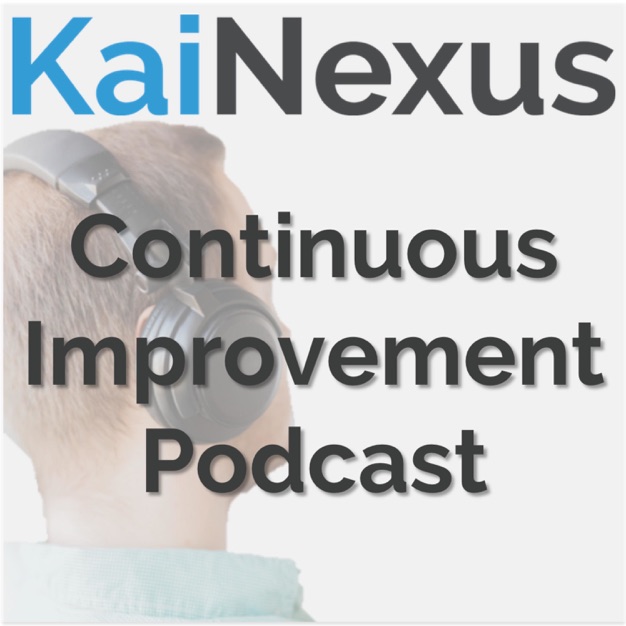 KaiNexus Continuous Improvement Podcast
KaiNexus Continuous Improvement Podcast
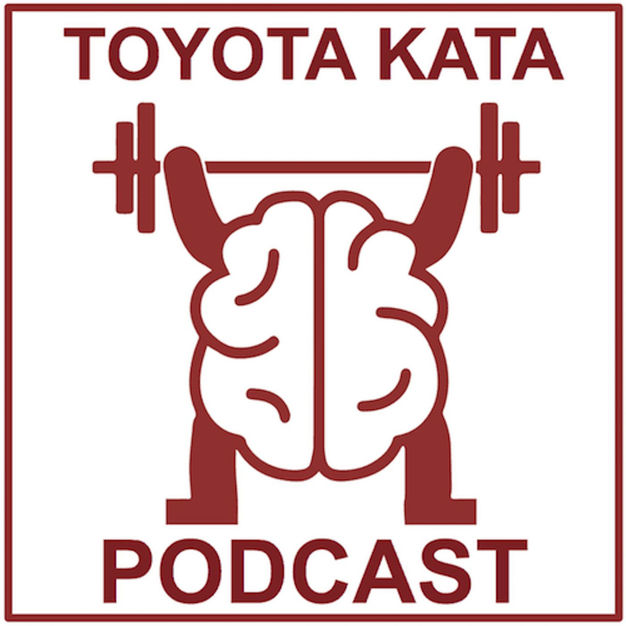 Toyota Kata Podcast
Toyota Kata Podcast
 WLEI - Lean Enterprise Institute's Podcast
WLEI - Lean Enterprise Institute's Podcast
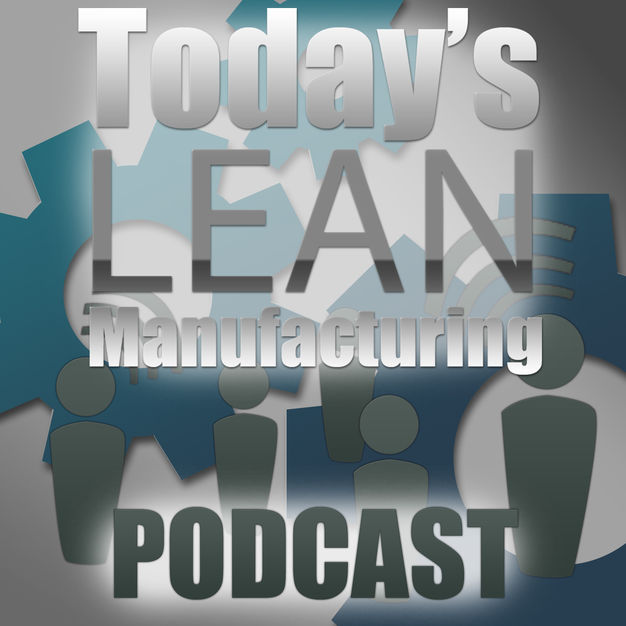 Today's Lean Manufacturing
Today's Lean Manufacturing
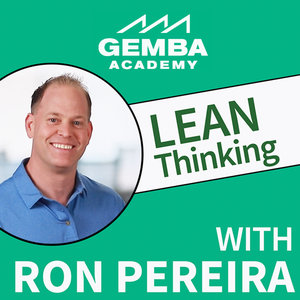 Gemba Academy Podcast: Lean Six Sigma | Toyota Kata | Productivity | Leadership
Gemba Academy Podcast: Lean Six Sigma | Toyota Kata | Productivity | Leadership
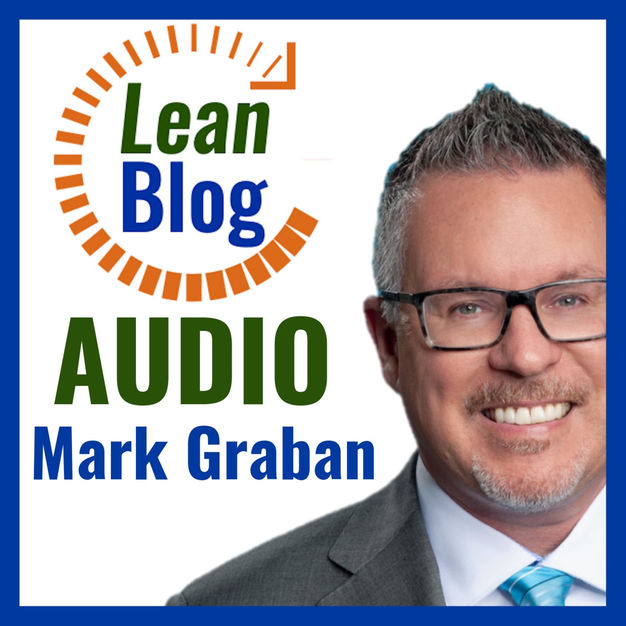 Lean Blog Audio
Lean Blog Audio